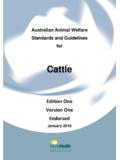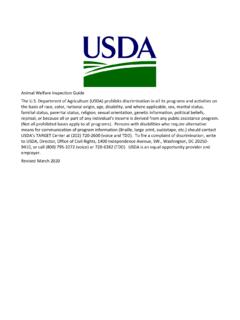Transcription of NATIONAL CHICKEN COUNCIL ANIMAL WELFARE …
1 1 NATIONAL CHICKEN COUNCIL ANIMAL WELFARE GUIDELINES AND AUDIT CHECKLIST FOR BROILERS Approved by NCC Board of Directors 2 February 2017 NATIONAL CHICKEN COUNCIL 1152 15TH Street NW Suite 430 Washington DC 20005 phone (202) 296-2622 1 Contents NCC ANIMAL WELFARE Guidelines NCC ANIMAL WELFARE Audit Checklist Guidance for Conducting Audits Under NCC ANIMAL WELFARE Guidelines Standard Contract for Audits Under NCC ANIMAL WELFARE Guidelines Appendix 2 NATIONAL CHICKEN COUNCIL ANIMAL WELFARE GUIDELINES The NATIONAL CHICKEN COUNCIL (NCC) is the NATIONAL trade association representing vertically integrated broiler producer-processors.
2 NCC recommends the following guidelines to its members to assure the humane treatment of animals and to promote the production of quality products. Preface An ANIMAL is considered to be in a good state of WELFARE ..if (as indicated by scientific evidence) it is healthy, comfortable, well nourished, safe, able to express innate behaviour, and if it is not suffering from unpleasant states such as pain, fear, and distress (OIE). Animals physical needs are relatively easily discussed, described, and studied, but their mental states and needs can be more difficult to characterize.
3 We recognize that this is an ongoing discussion and evolving science. With that in mind, the NCC ANIMAL WELFARE Guidelines are updated regularly to include new science-based parameters. The NCC ANIMAL WELFARE Guidelines have been developed to evaluate the current commercial strains of broiler CHICKEN by auditing how these birds are raised, housed, managed, and slaughtered. It is important to note that such standards may not be appropriate for other types of poultry as management practices may differ. The following principles (which apply to all types of housing and strains of chickens) were considered in the development of this document: 1.
4 Poultry raised for food should be cared for in ways that prevent or minimize fear, pain, stress, and suffering. 2. Guidelines for WELFARE should balance scientific knowledge and professional judgment with consideration of ethical and societal values. 3. It is the WELFARE of the chickens themselves that is foremost, not how humans might perceive a practice or an environment. 4. Poultry should be treated with respect throughout their lives and provided a humane death when processed for food or when they are euthanized for any other reason.
5 5. The NCC ANIMAL WELFARE Guidelines and Audit Checklist are formally reviewed every two years, with the current review conducted by a committee of scientific advisors followed by a review by the NCC ANIMAL WELFARE Committee, who recommends final changes to the NCC Board of Directors. This two-year cycle will continue indefinitely. 3 Introduction Domestic animals are adaptable to a variety of conditions. Today s broiler CHICKEN has been selected to thrive under modern management conditions. Management practices that promote good health and production, prevent disease, and minimize stress are consistent with generally accepted criteria of humane treatment.
6 The specific applications of these criteria are spelled out in these guidelines and the checklist is used assess compliance. Broiler CHICKEN producers and processors endorsing these guidelines must designate a management person or group within the company responsible for promoting adherence to the guidelines. NCC ANIMAL WELFARE Guidelines for Broilers, which outline best practices for broiler production and processing, are categorized into the following sections: A. Corporate Commitment B. Personnel Training C.
7 Hatchery Operations D. Grow-out Operations: D1. Designated Management, Training, and Emergency Plan D2. Nutrition and Feeding D3. Comfort and Shelter D4. Health Care and Monitoring D5. Flock Husbandry E. Catching and Transportation F. Processing Operations G. Abuse and Audit Failures History February 1999 Guidelines originally approved by Board of Directors January 2001 Revision approved by Task Force, additional revisions made by Executive Committee February 2001 Additional revisions made by Board of Directors.
8 Revisions approved by Board of Directors July 2001 Revisions recommended by Task Force September 2001 Revisions approved by Executive Committee October 2001 Revisions approved by Board of Directors December 2001 Revisions recommended by Task Force January 2002 Revisions approved by Executive Committee December 2002 Revisions recommended by Task Force January 2003 Revisions approved by Executive Committee March 2003 Amendment approved by Board of Directors 4 January 2005 Revisions approved by Executive Committee April 2005 Amendments approved by Executive Committee December 2009 Revisions approved by Task Force January 2010 Minor edits approved by Task Force Chairman, revisions approved by Executive Committee and Board of Directors January 2014 Minor edits approved by Task Force Chairman, revisions approved by Executive Committee and Board of Directors November 2016 Revisions recommended by Task Force February 2017 Revisions approved by Board of Directors 5 GUIDELINES A.
9 Corporate Commitment 1). The company must have a written ANIMAL WELFARE program that provides a clear understanding of how the program is to be implemented throughout the company. 2). Current senior management must endorse and fully-support the ANIMAL WELFARE program. 3). The company must have a person or management group responsible for ANIMAL WELFARE throughout the operation. 4). The company must have, implement, and document an internal ( , first party) and an external ( , third party) auditing program. 5).
10 The company must have a mechanism in place whereby ANIMAL WELFARE violations can be reported without threat of retaliation. Signs stating the importance of ANIMAL WELFARE with contact information for reporting incidents should be posted prominently in locations where birds are handled. B. Personnel Training 1). All employees who work with live birds must be trained at least annually on the fundamentals of CHICKEN behavior and WELFARE . An optional training program is included in Appendix 1. 2). All employees who handle live birds must also be trained annually using a SOP-based or task-specific training program that focuses on acceptable procedures at the specific locations where they work (hatchery, grow-out, catching and transportation, and slaughter).






